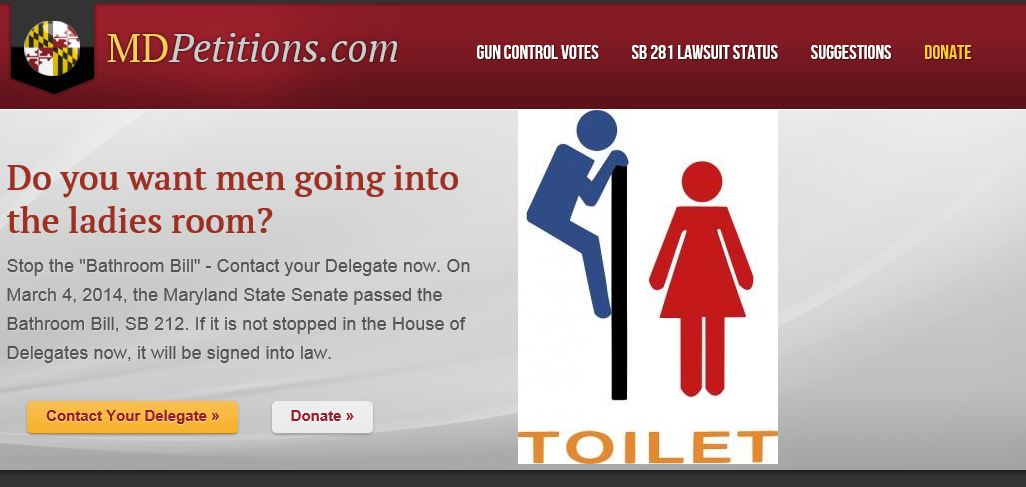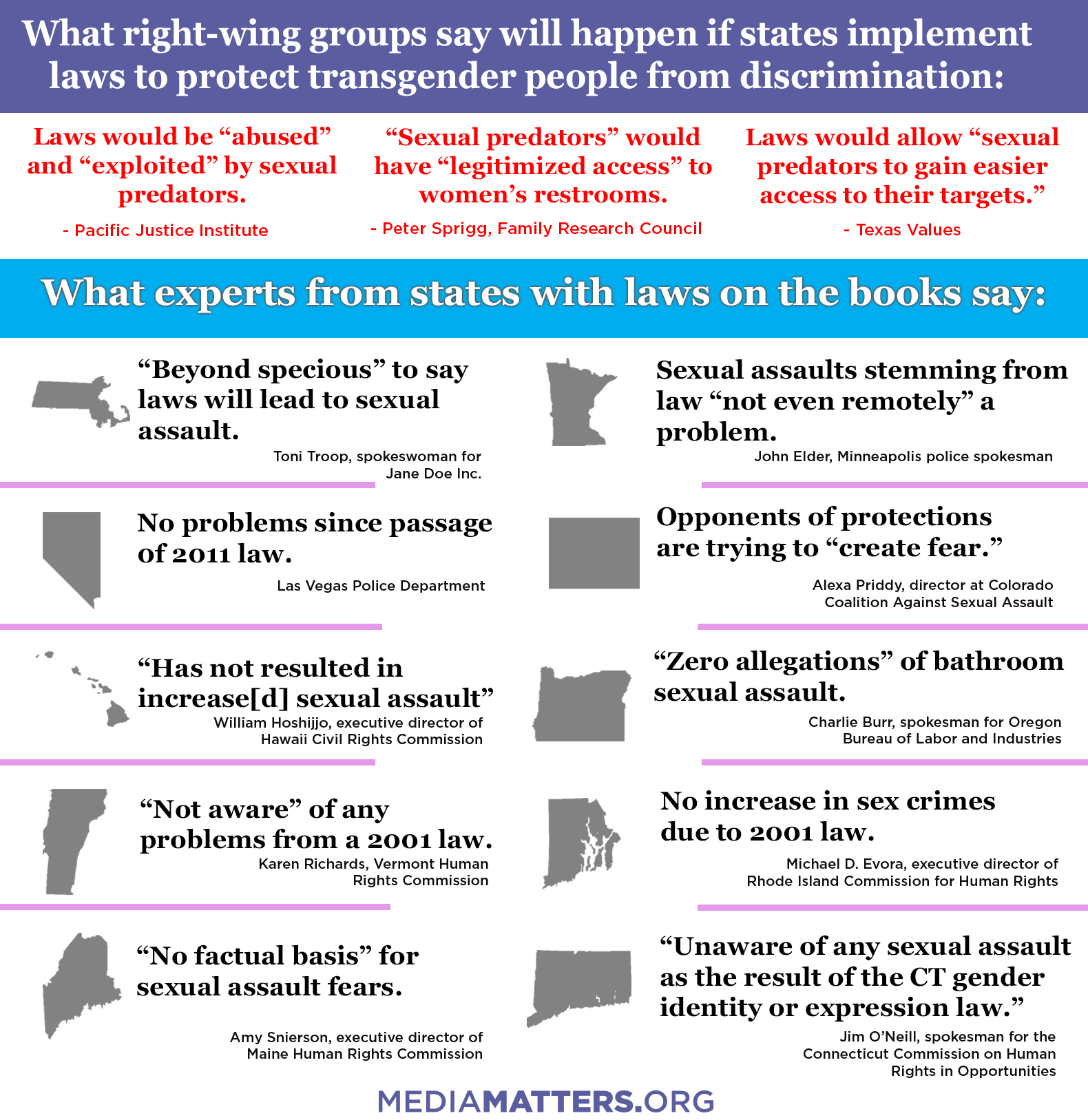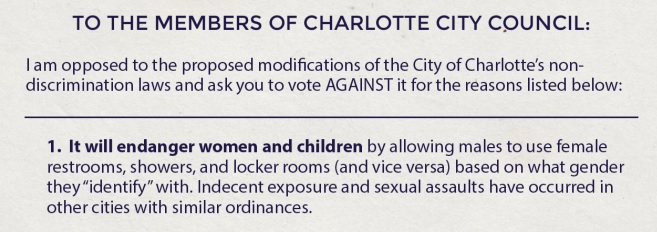The Toughest Obstacle for Trans Rights is Fear Mongering
By:
"[Transgender women] rape women every 9 minutes." -- poster against fair bathroom access at Univ. of Bristol in Jan. 2015
"[The] ordinance would include [...] the so called 'transgendered,' allowing a biological male to legally enter women's public bathrooms [...] and expose himself to women and girls or just ogle them like a peeping Tom. All he has to claim is that he 'thinks of himself as a woman.'" -- statements by Steve Hotze against Houston, Texas, non-discrimination ordinance in 2014
Anti-transgender bathroom bills are a ridiculous, but serious menace to the trans community that we just can't seem to collectively stop. Year after year, legislators draft bills that seek to block trans people from bathrooms that are safe and appropriate to their gender identity. Sometimes, they take the form of preemptive measures - removing the supposed 'threat' from restrooms before the boogeyman is allowed through the front door. But more often, these bills react to the logic of a school, business, or state that has recognized the humanity of a trans customer, student, or citizen in their midst by letting them pee in peace.
Currently, multiple bills are pending at a state-level that seek to bar trans Americans from the bathroom. How did we get here?
Sadly, it's easy to discriminate against a group of people who seem so foreign. When you erase someone's lived reality, you also blot our their humanity, making ridiculous scare tactics more effective.
How ridiculous? Let's take a look.
When a teenage girl in 2013 was allowed to use the bathroom at her Colorado high school that corresponded to her gender, it was apparently very threatening. So threatening, in fact, that an out-of-state organization produced a video and made her story a national issue with a campaign targeting her ability to use the bathroom:
Although no problems were reported from the student's use of a gender-appropriate restroom, Pacific Justice Institute took aim anyway. Claiming that the trans teen was "inherently harassing" her classmates simply by using the restroom that matched her gender identity, PJI interviewed a hand-selected cohort of parents and their kids for a film. Setting their opinions and disembodied hands (to preserve anonymity...) to ominous background music, the claims made in the ad sound just as absurd and transphobic as they are when separated from the dramatic framing:
Myth: "You have private parts for a reason, and now they're not private anymore." (Unidentified mom in the video.)
Reality: Do kids go around waving their genitals in each others faces in the bathroom? This certainly never happened when I was a kid - or as an adult, thankfully - so it's hard to see how they're no longer private. The only people talking about genitals are the folks in the video and Pacific Justice Institute. So, it actually looks like the one whose privacy is being violated is the trans teen, not the other way around.
Myth:"This is not [...] my daughter's problem that he has decided to do this." (Unidentified mom in the video.)
Reality: There is a problem, and it's the lack of compassion being passed on from mother to daughter by these transphobic statements. But it's easier to discriminate when you discount the other person's reality entirely. Transgender people don't usually "decide" to be transgender. A recent study shows that trans kids actually have firmly rooted gender identities that are just as stable as their cisgender (non-transgender) counterparts. By refusing to respect the trans student's correct pronouns - those interviewed continually use 'he' rather than 'she' - those speaking in the video negate her gender entirely.
Despite the alarmist rhetoric, the only person who was actually harmed throughout the entire process was the trans teenager herself. (The student became so distressed as a result of the relentless attack that she was placed on suicide watch.)
Bathrooms also become an inroad for transphobic individuals to dismantle broader trans-inclusive laws.
An even more sensational campaign was waged the same year in Delaware, where an old 2008 ad was reworked by Delaware Family Policy Council in an attempt to stop Senate Bill 97.
SB 97, which was ultimately signed into law, gives transgender people equal footing with other state residents in employment, housing, public accommodations, and credit by updating the state's anti-discrimination statutes. Despite the bill's wide focus, the group didn't mention those protections, which are the bulk of the bill. Instead, the Delaware Family Policy Council chose to zero in on the issue most likely to raise alarm: bathrooms.
The Bathroom Bill from Delaware Families on Vimeo.
This attack ad doesn't even feature dialogue to dissect for factual accuracy. Instead it plays off of the common myth that treating transgender people fairly will invite rapists and pedophiles into women's restrooms. It depicts a cisgender man following a little girl from the playground into the women's restroom. Then, with the noise of children playing in background, the video asks: "Is this what you want for Delaware?"
What this has to do with transgender people is unknown to me, since there are no transgender people in the video.
I do know that a 2013 study in the Journal of Public Management and Social Policy found that 70 percent of transgender respondents had been "denied entrance, were harassed or assaulted when attempting to use a public restroom of their identifying gender." In contrast, laws that make bathrooms safer for transgender people have led to a zero percent increase in assaults and rapes, although this radio spot attacking an LGBT non-discrimination bill in Colorado would have you think otherwise:
Announcer: If the Colorado Legislature has its way...
Girl 1: Mom! A man in a dress came into the girl's bathroom at school today!
Announcer: We could be dealing with a new type of predator...
The obvious question that no one seems to be asking: Does anyone really think men looking to assault women in a bathroom don't do so now because there is a "women-only" sign on the door?
It's not like the blue plastic sign serves as garlic to ward off sexual predators. But despite the illogic of these scare tactics, it seems like every proposed law that protects transgender people is described this way, as having "chilling effects" on the "privacy, safety and modesty," particularly for women. Take a look at these ads from different campaigns in different states, one from 2011 in Massachusetts and one from 2014 in Maryland:

Three years sadly makes little difference in the absurd message that making transgender people safer somehow makes others less safe.
It's nice to think we've moved beyond these myths in 2015, but we haven't.
Experts have repeatedly debunked the myths surrounding trans-inclusive restroom policies.

h/t Media Matters
The facts seem straightforward. But they weren't in Charlotte, N.C., where an LGBT non-discrimination ordinance failed Mar. 2, largely because it allowed transgender people to access safe and appropriate restrooms.
BillyGraham.org president Franklin Graham parroted misinformation that we've heard before, publicly urging Charlotte residents to push for a veto: "Common sense tell us that this would open the door, literally, to all sorts of serious concerns including giving sexual predators access to children."
These ideas were a deciding factor for the ordinance. "A man's right to choose the lady's room is ridiculous and it's dangerous," said Charlotte community member Jeannette Wilson at the city council meeting.
Wilson probably got her erroneous idea that transgender women were men from the #Don'tDoItCharlotte campaign.

States are still falling prey to these scare tactics, too.
Kentucky is poised to bar trans students from using gender-appropriate locker rooms and bathrooms if a recent piece of legislation (SB 76) moves forward. And Texas would like to make it a crime for transgender people to use the bathroom that makes them feel safe and comfortable.
It's passed time to see the rhetoric for what it is - and to realize who these bills actually effect: everyday transgender people like Aydian Dowling.
Dowling is transguy. Unsurprisingly, since Dowling lives as a man, he uses male restroom facilities. And since Dowling transitioned from female-to-male, he also possesses a set of XX chromosomes in addition to some shoulder muscles that make me seriously jealous. (Those are the same chromosomes that would forever relegate this bearded face to women's restrooms across Texas, assuming state Rep. Debbie Riddle's Feb. 20 bathroom bill passes.)
Besides being a community advocate, Dowling most recently posed for an FTM Magazine photo recreation of Adam Levine's nude shoot, which raised awareness of prostate and testicular cancers in 2011.
According to FTM Magazine publisher Jason Ballard "We've had comments saying 'he doesn't look trans' which brings up a great point on what does trans even look like? Perhaps we're struggling so hard for our rights here because people have a false sense of who we are."
Although I agree with Ballard, I also wonder why a transman should need to strip down naked for society to fully see and accept him.
Importantly, to be an ally also doesn't mean only advocating for the physical and psychological well-being of trans and gender-variant people who look "normal" (whatever that means). Or, as in Dowling's case, really sexy. It means recognizing the gender identity that an individual states, regardless of their adherence to stereotyped gender roles, and respecting that identity without question or reservation.
Should trans and gender-variant people only be able to use the appropriate restroom if society agrees that they're performing their gender well enough? That they must look like a certain kind of man or woman to have their basic humanity recognized with fair and equal treatment?
Trans bodies are not public property nor are they up for public critique. Perhaps if we were less obsessed with genitals, there would be less fear and curiosity around what a transwoman has in her pants in the restroom stall and more recognition that we're all human with similar needs - like access to safe public restrooms.
